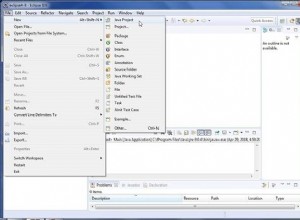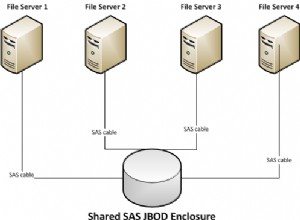essayez
CREATE TABLE [dbo].[Names]
(
[Name] [nvarchar](64) NOT NULL,
[CreateTS] [smalldatetime] NOT NULL CONSTRAINT CreateTS_DF DEFAULT CURRENT_TIMESTAMP,
[UpdateTS] [smalldatetime] NOT NULL
)
PSI pense qu'un petit datetime est suffisant. Vous pouvez décider différemment.
Ne pouvez-vous pas faire cela au "moment de l'impact" ?
Dans SQL Server, c'est courant :
Update dbo.MyTable
Set
ColA = @SomeValue ,
UpdateDS = CURRENT_TIMESTAMP
Where...........
Sql Server a un type de données "timestamp".
Mais ce n'est peut-être pas ce que vous pensez.
Voici une référence :
http://msdn.microsoft.com/en-us/library/ms182776(v=sql.90).aspx
Voici un petit exemple de RowVersion (synonyme de timestamp) :
CREATE TABLE [dbo].[Names]
(
[Name] [nvarchar](64) NOT NULL,
RowVers rowversion ,
[CreateTS] [datetime] NOT NULL CONSTRAINT CreateTS_DF DEFAULT CURRENT_TIMESTAMP,
[UpdateTS] [datetime] NOT NULL
)
INSERT INTO dbo.Names (Name,UpdateTS)
select 'John' , CURRENT_TIMESTAMP
UNION ALL select 'Mary' , CURRENT_TIMESTAMP
UNION ALL select 'Paul' , CURRENT_TIMESTAMP
select * , ConvertedRowVers = CONVERT(bigint,RowVers) from [dbo].[Names]
Update dbo.Names Set Name = Name
select * , ConvertedRowVers = CONVERT(bigint,RowVers) from [dbo].[Names]
Peut-être un exemple de travail complet :
DROP TABLE [dbo].[Names]
GO
CREATE TABLE [dbo].[Names]
(
[Name] [nvarchar](64) NOT NULL,
RowVers rowversion ,
[CreateTS] [datetime] NOT NULL CONSTRAINT CreateTS_DF DEFAULT CURRENT_TIMESTAMP,
[UpdateTS] [datetime] NOT NULL
)
GO
CREATE TRIGGER dbo.trgKeepUpdateDateInSync_ByeByeBye ON dbo.Names
AFTER INSERT, UPDATE
AS
BEGIN
Update dbo.Names Set UpdateTS = CURRENT_TIMESTAMP from dbo.Names myAlias , inserted triggerInsertedTable where
triggerInsertedTable.Name = myAlias.Name
END
GO
INSERT INTO dbo.Names (Name,UpdateTS)
select 'John' , CURRENT_TIMESTAMP
UNION ALL select 'Mary' , CURRENT_TIMESTAMP
UNION ALL select 'Paul' , CURRENT_TIMESTAMP
select * , ConvertedRowVers = CONVERT(bigint,RowVers) from [dbo].[Names]
Update dbo.Names Set Name = Name , UpdateTS = '03/03/2003' /* notice that even though I set it to 2003, the trigger takes over */
select * , ConvertedRowVers = CONVERT(bigint,RowVers) from [dbo].[Names]
Faire correspondre la valeur "Nom" n'est probablement pas judicieux.
Essayez cet exemple plus courant avec une SurrogateKey
DROP TABLE [dbo].[Names]
GO
CREATE TABLE [dbo].[Names]
(
SurrogateKey int not null Primary Key Identity (1001,1),
[Name] [nvarchar](64) NOT NULL,
RowVers rowversion ,
[CreateTS] [datetime] NOT NULL CONSTRAINT CreateTS_DF DEFAULT CURRENT_TIMESTAMP,
[UpdateTS] [datetime] NOT NULL
)
GO
CREATE TRIGGER dbo.trgKeepUpdateDateInSync_ByeByeBye ON dbo.Names
AFTER UPDATE
AS
BEGIN
UPDATE dbo.Names
SET UpdateTS = CURRENT_TIMESTAMP
From dbo.Names myAlias
WHERE exists ( select null from inserted triggerInsertedTable where myAlias.SurrogateKey = triggerInsertedTable.SurrogateKey)
END
GO
INSERT INTO dbo.Names (Name,UpdateTS)
select 'John' , CURRENT_TIMESTAMP
UNION ALL select 'Mary' , CURRENT_TIMESTAMP
UNION ALL select 'Paul' , CURRENT_TIMESTAMP
select * , ConvertedRowVers = CONVERT(bigint,RowVers) from [dbo].[Names]
Update dbo.Names Set Name = Name , UpdateTS = '03/03/2003' /* notice that even though I set it to 2003, the trigger takes over */
select * , ConvertedRowVers = CONVERT(bigint,RowVers) from [dbo].[Names]




